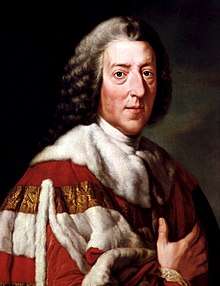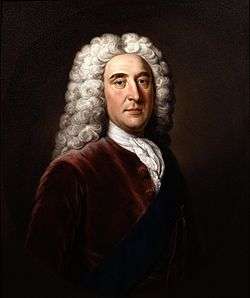Pitt–Newcastle ministry
The Pitt–Newcastle ministry governed the Kingdom of Great Britain between 1757 and 1762, at the height of the Seven Years' War.[1] It was headed by Thomas Pelham-Holles, 1st Duke of Newcastle, who was serving in his second term as Prime Minister. The most influential and famous figure in the government however was William Pitt, who served as Secretary of State.
The ministry ended a period of political instability, when Britain had struggled in the war. Pitt was a strong war leader, but lacked the support in parliament necessary to provide effective leadership. Newcastle provided this, as he has a strong base of support in the House of Commons. They divided duties between them: Pitt directed defence and foreign policy, while Newcastle controlled the nation's finances and patronage.
The ministry was very successful leading Britain to many victories in the war, particularly in the so-called Annus Mirabilis of 1759, which put the country in an immensely strong position by 1761. That year Pitt resigned over a dispute concerning the entry of Spain into the war. The ministry had been under pressure since the death of the old King with the accession of King George III, who disliked both Pitt and Newcastle and favoured John Stuart, 3rd Earl of Bute. Bute had joined the Cabinet as Northern Secretary in March 1761, and following Pitt's resignation the ministry was sometimes referred to as the Bute–Newcastle coalition.[1][2]
In 1762 Newcastle was forced to resign, with his followers (the "Pelhamites") sacked by Bute in the "Massacre of the Pelhamite Innocents";[3][4][5] this is traditionally considered to have been the moment the ministry collapsed.[6]
The Ministry
It is unclear who was member of the ministry.
References
- Chris Cook; John Stevenson (1980). British Historical Facts, 1760–1830. Archon Books. p. 11. ISBN 0208018689.
- Namier, Lewis; Brooke, John (1985). The House of Commons 1754–1790. Boydell & Brewer. p. 518. ISBN 9780436304200.
- Roberts, Clayton; Roberts, David F.; Bisson, Douglas (July 2016). A History of England, Volume 2: 1688 to the Present. Routledge. p. 311. ISBN 978-1-315-50960-0.
- Kelch, Ray A. (1974). Newcastle; a Duke Without Money: Thomas Pelham-Holles, 1693-1768. University of California Press. p. 178. ISBN 978-0-520-02537-0.
- Bloy, Marjie (30 April 2017). "The Massacre of the Pelhamite Innocents". Retrieved 16 August 2017.
- Middleton 1985, p. 209.
- "Haydn's Book of Dignities, 1851, page 112".
- "Haydn's Book of Dignities, 1851, page 168".
- "Haydn's Book of Dignities, 1851, page 105".
- "Haydn's Book of Dignities, 1851, page 119".
- "Haydn's Book of Dignities, 1851, page 147".
- "Haydn's Book of Dignities, 1851, page 172".
- "Haydn's Book of Dignities, 1851, page 192".
- "Haydn's Book of Dignities, 1851, page 160".
- "Haydn's Book of Dignities, 1851, page 401".
- "Haydn's Book of Dignities, 1851, page 206".
- Kinnoull and Duchy of Lancaster have different dates stated for the change due to the death of The Lord Edgcumbe on 25 December 1758.
- "Haydn's Book of Dignities, 1851, page 209".
Bibliography
- Middleton, Richard (1985). The Bells of Victory: The Pitt-Newcastle Ministry and the Conduct of the Seven Years' War, 1757–1762. Cambridge University Press.CS1 maint: ref=harv (link)
| Preceded by Caretaker ministry |
Government of Great Britain 1757–1762 |
Succeeded by Bute ministry |


.svg.png)